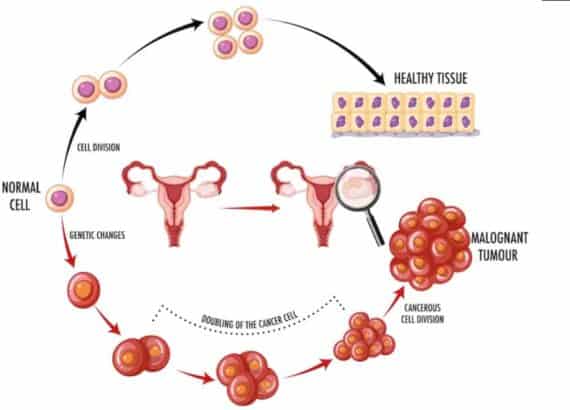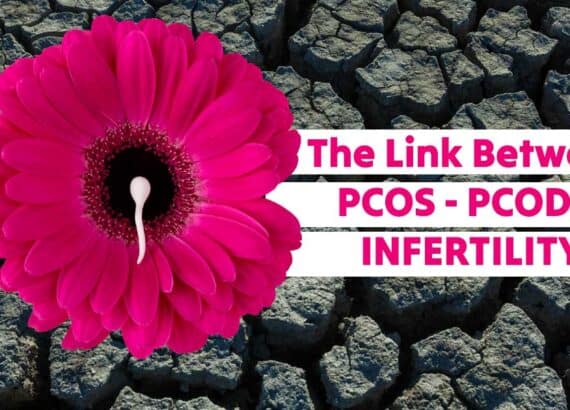The Top 10 Signs & Symptoms of PCOS & PCOD

Women’s hormonal health is frequently affected by PCOS (Polycystic Ovarian Syndrome) and PCOD (Polycystic Ovarian Disease). One in ten women worldwide has PCOS or PCOD, which, if untreated, can result in a number of health problems. Many women, however, go years without receiving a diagnosis because they are unaware of the symptoms or the gravity of them. The top 10 indicators and symptoms of PCOS and PCOD are shown below.
- Irregular Period : Period irregularities are among the most prevalent signs and symptoms of PCOS and PCOD. Women who have these illnesses may miss their period entirely or have periods that are heavier or lighter than usual. This occurs as a result of hormonal imbalances brought on by PCOS and PCOD, which have an impact on the regularity of menstrual periods.
- Acne : Another typical symptom of PCOS and PCOD is acne. Acne may appear on a woman’s face, breasts, or back if she has certain disorders. Due to the fact that hormonal imbalances can produce excessive oil production, which can block pores and cause acne, this occurs.
- Excessive growth of hair : Hirsutism, or excessive hair growth, is a typical sign of PCOS and PCOD. On their faces, chests, backs, and other parts of their bodies, these women may have excessive amounts of hair growth. This occurs as a result of hormonal abnormalities that might raise androgen levels, which can result in excessive hair growth.
- Gaining weight : A typical sign of PCOS and PCOD is weight gain. Even with diet and exercise, it may be challenging for women with certain illnesses to lose weight. Due to insulin resistance, which can make it more difficult for the body to digest glucose and accumulate fat, hormonal imbalances might cause this to occur.
- Fatigue : Another typical sign of PCOS and PCOD is fatigue. Even with enough rest, women with certain illnesses may feel exhausted. This occurs since hormonal abnormalities can have an impact on energy levels and result in weariness.
- Headaches : PCOS and PCOD are frequently accompanied by headaches. Several disorders can cause headaches in women, especially during the menstrual cycle. Because hormonal imbalances can impact blood sugar levels and result in headaches, this occurs.
- Mood changes : A typical sign of PCOS and PCOD is mood swings. Several illnesses can cause mood fluctuations, irritability, and sadness in women. This occurs because serotonin levels can fluctuate as a result of hormonal abnormalities, which can also induce mood swings.
- Infertility : One typical sign of PCOS and PCOD is infertility. Even with fertility treatments, it may be difficult for women with these problems to become pregnant. This occurs because hormonal imbalances might interfere with ovulation and make it more difficult to get pregnant.
- Pelvic discomfort : A typical sign of PCOS and PCOD is pelvic pain. Pelvic pain is a possibility for women with certain diseases, particularly during the menstrual cycle. This occurs because hormonal imbalances can lead to pelvic pain and inflammation.
- Slumber apnea : One typical sign of PCOS and PCOD is sleep apnea. Women who have these issues may develop sleep apnea, a sleeping disorder that disrupts breathing while you sleep. This occurs as a result of the fact that hormonal imbalances can promote excessive weight gain, which can cause sleep apnea.
In conclusion, prevalent diseases like PCOS and PCOD have an impact on women’s hormonal
health. It’s crucial to discuss these symptoms with your healthcare provider if you experience any of them. Early detection and treatment of these disorders can lessen the risk of long- term health consequences






Comments
Trackbacks & Pingbacks
[…] and metabolism. However, when our hormones become imbalanced, it can lead to a host of unpleasant symptoms that can negatively impact our daily […]
[…] (Polycystic Ovary Syndrome) and PCOD (Polycystic Ovary Disease) are common hormonal disorders affecting women of reproductive age. Symptoms of these conditions […]
[…] there is no cure for PCOS, there are several ways to manage the condition, including the use of soy […]